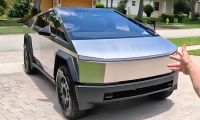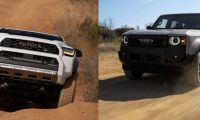Tesla has caused a great deal of controversy with its method of selling cars. Rather than use traditional dealerships that are far from ideal for selling electric vehicles, the company elected to sell its vehicles online and through Tesla-owned retail stores located in places like shopping malls. In many states, outdated laws prevent the company from actually selling vehicles at the stores; these locations only serve as ‘galleries’ to inform and educate shoppers.
In March, the New Jersey Motor Vehicle Commission abruptly passed a new rule requiring manufacturers to sell new vehicles through middlemen in showrooms at least 1,000 square feet with service facilities on-site. As a result, Tesla could no longer sell vehicles at its two New Jersey stores starting April 15, and the company made no attempt to hide its displeasure.
Edit: A previous version of this article incorrectly stated the rule was passed by the state legislature. We regret the error.
New Jersey backtracks, but with an asterisk
Last week, though, the state’s Assembly Consumer Affairs Committee voted 4-0 to approve a bill that “Permits certain zero emission vehicle manufacturers to directly sell motor vehicles to consumers and requires them to operate service facilities.” The bill also stipulated that any company selling zero-emission vehicles directly to consumers would only be permitted to open up to four stores in the state.
“New Jersey prides itself as being pro-business, pro-innovative and pro-jobs. And this is a company that is an American company, an American idea,” said Assemblyman Tim Eustace. “I think we would be mistaken if we didn’t reverse the idea that the [Motor Vehicle Commission] made, making it illegal to sell Teslas in New Jersey.”
The bill appeases Tesla and its supporters by allowing the company to sell vehicles as it pleases, but also caters to the desires of the auto dealer lobby by limiting zero-emission vehicle manufacturers to four stores in the state. For the time being, Tesla won’t need to exceed the four-store limit. But if the company becomes as big as it hopes to, selling all its vehicles directly could have a significant impact on the legacy dealership business model.
Looking forward
So what happens if and when Tesla reaches the size of some of the auto industry’s major players? Many industry observers believe that Tesla will not be able to continue its current direct-to-consumer sales model once its sales volumes increase dramatically with the launch of the mass-market Generation III car. Some speculate that the company will eventually be forced to resort to a more traditional franchised dealership method.
Jim Appleton, president of the New Jersey Coalition of Automotive Retailers, would like to see that. He said the bill gives Tesla “a reasonable period of time to ramp up operations (or sales volume) before they conform their business operations to the franchise model.”
Similarly, Eustace pointed out that Henry Ford did not sell his first cars through dealerships either. “As the company grows, they may need to change their business model. This business model is for right now,” he said.
It is hard to say what will become of the existing sales strategy of Tesla Motors. It could be argued that online sales, which the company prefers, are the way of the future while dealers belong in the 20th century. The key for Tesla lies with its service centers, which are separate from the stores. Currently the company has 70 either open or coming soon in North America.
Tesla currently delivers its custom-ordered Model S vehicles to the nearest service center for the customer to pick up. However, the logistics of that system will become far more difficult as sales volumes soar, and with ever-increasing numbers of its vehicles on the road service could become a nightmare if the company isn’t prepared (even though its vehicles, being electric and capable of over-the-air software updates, will require less service than conventional cars). Tesla will need and plans to open many more service locations to provide the convenience offered by ubiquitous car dealers.
When will the public be sufficiently educated?
I don’t see Tesla abandoning its current business model anytime soon. However, the initial goal of the stores was primarily to raise public awareness by placing them in high-profile locations. As former VP of sales George Blankenship said, “Our goal is not to sell a person a car, but to educate them on what electric cars and, particularly, what Tesla electric cars can provide.”
At what point does Tesla determine it has reached that goal? Educating the casual passersby on Tesla and electric vehicles will become less important over the years as they become more common, so it is possible that a tipping point will be reached where the company feels it will be safe to conform to a more traditional sales model if it runs into problems with very high volumes of production. That point is still years away, though, so for now the company is just grateful it will be able to resume sales in New Jersey even on a somewhat restricted basis.












Comments
A few corrections: 1) NJ
Permalink
A few corrections: 1) NJ legislature did NOT vote to enforce anything, the MVC passed a new rule preventing Tesla from renewing their dealership license by requiring a franchise contract. 2) The decades old law only required franchisors to sell through franchises, there is nothing in the law that prevents Tesla from selling direcly. What prevented Tesla from selling directly was the NEW rule passed by the MVC(which is NJ DMV)
And there is no reason for Tesla to conform to the traditional model. On-demand manufacturing eliminates that need. The reason why manufacturers like dealers is because they offload cars to the dealers. By eliminating monthly sales reporting and keeping it quarterly and making on-demand manufacturing, Tesla completely eliminated the purpose of dealerships. Since EVs have no maintenance to do like oil changes and the like, they eliminated a lot of the need for regular visits. When the tipping point comes, Tesla might not need as many showrooms and that is about it. There is no benefit of the traditional model regardless of how many cars Tesla sells.
Thanks for pointing that out,
Permalink
In reply to A few corrections: 1) NJ by Weapon (not verified)
Thanks for pointing that out, weapon. I corrected the error.
Tesla is not going to conform
Permalink
Tesla is not going to conform to the more traditional sales model of dealership. Tesla is going to make you see how flaw the dealership model is and its protection law should be removed from the free market.